Tim Rice had a hunch the Oscar was in the bag. After all, he and Elton John had been responsible for three of the five nominations in the best song category. But, as he walked on stage that night in 1995, after Can You Feel the Love Tonight from The Lion King won, the tall, slightly awkward-looking English lyricist had no idea what he was going to say. So he drew a breath then decided, on a whim, to thank his childhood hero, Denis Compton. No one in the Hollywood audience had heard of the England and Middlesex cricketing all-rounder and his words were greeted with a bemused silence.
Rice laughs at the memory and puts on a throaty American drawl to recount the scene back stage when reporters swarmed. “What movies was this guy Compton in?” “Oh, I said, he was in The Final Test.” “But what part did he play?” “Well, he played Denis Compton – and frankly, I thought he captured the character very well.”
He chortles away, still roguish at 76 and ever the raconteur. But then Rice is at his best telling stories. They’re the key to his craft. “A good story always inspires good words,” he says. And, over the past six decades, Rice has written some very good words for the biggest names in music, from Freddie Mercury to Madonna. Mention his name, though, and people are likely to think of him as part of a duo alongside – or even eclipsed by – Andrew Lloyd Webber. Yet as a lyricist, Rice has won three Oscars, two more than Lloyd Webber.
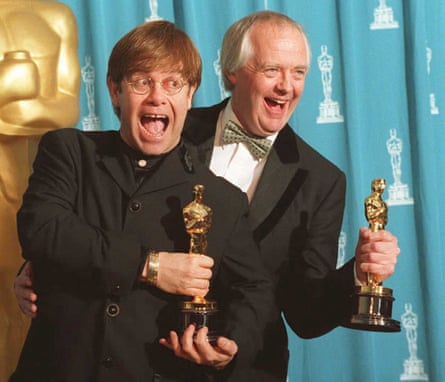
Why isn’t he more of a national treasure? “I really don’t like people saying everything is wonderful,” Rice says, when I suggest that he may be a bit too, well, self-effacing for someone with three Academy awards. “I don’t want to completely put myself down – because there’s the frightening possibility that people might agree.” Is there anything he will say? “I think I’m quite good at judging my material, partly because it’s only half mine in most cases.”
He’s speaking to me from his six-acre country home near Henley-on-Thames in Oxfordshire, a leafy retreat he moved to three years ago. Outside, the afternoon light’s fading and his dog is impatient for a walk. Rice has spent the day organising all the songs he’s ever written – putting his house in order “in case I get hit by a bus next week”. He’s been struck by how many never appeared in films or shows: 145 in all. Most are pretty average, he says, particularly the early ones. “It’s made me realise just how much a show helps a song.”
None more so than the hit musical Evita. A “bonkers” idea, he says, that came to him after hearing a radio programme about Eva Perón, the glamorous wife of Juan Perón, three times president of Argentina. The show made him drop everything and jump on a plane to Buenos Aires to do some research. “The best stuff I’ve written is when I have characters and I know what situation they’re in – and I think, ‘What would I say in that situation?’”
Which is exactly how Don’t Cry For Me Argentina, possibly his most famous song, came about. “Had the tune been given to me by Andrew and he’d said, ‘Let’s make this a hit song for somebody’, I’d have written a pretty average lyric. But because it was being seen in a show – with this lady dressed to the nines, speaking to her working-class voters, the people that she claimed to represent – I was able to write a different lyric that actually worked.”
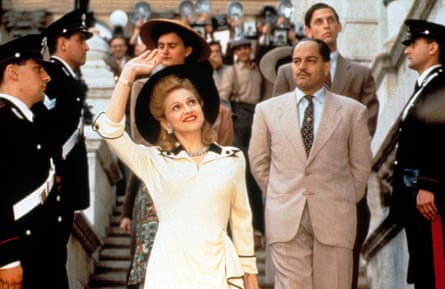
The powerful, lyrical result – “The truth is I never left you / All through my wild days / My mad existence / I kept my promise / Don’t keep your distance” – went to No 1 in the UK. But it wasn’t written to be a hit song, says Rice, it was written as a political speech, to be delivered to the people by Eva at a window. “I’m old-fashioned,” he says, when asked how he crafted the words. “I like a perfect rhyme. I don’t like time and mine, or girl and world.”
It wasn’t always that way. As a kid growing up in Buckinghamshire, Rice had no interest in rhyming couplets, much less musicals. He wanted to be a rock star. After leaving boarding school, he studied law because that’s what he felt his parents wanted, but he hated it. “I failed my exams three times,” he says, adding that he’d never even been to a show before, only panto. “It hadn’t crossed my mind that going to a musical was something I would enjoy.”
His life changed, he says, the day he met a 17-year-old called Andrew Lloyd Webber. He remembers it like yesterday: it was April 1965, at Lloyd Webber’s family home, a flat in South Kensington, London. “Andrew spent money on things like Georgian wine glasses and paintings and classical records, which was extraordinary to me.”
The two had been brought together by an agent because Lloyd Webber was looking for someone to put words to his melodies. “I breezed in and fitted the bill,” says Rice. “Our differences helped us. Also, my comparative ignorance about musical theatre helped because I wasn’t so concerned about doing what you ‘ought’ to do.” Hence, perhaps, their first collaboration, Joseph and the Amazing Technicolor Dreamcoat, written initially as a show for a school choir in London featuring an Elvis impersonator, who Rice played in that first production.
“We wrote something funny,” says Rice, “with a nice long list of colours. You can see why the kids liked it.” In fact, that big number, Joseph’s Coat, wasn’t entirely written by Rice. “I just ended it with red and yellow and green and brown.” But then the kids added another 20 colours of their own. “It just worked – and it’s now one of the most popular songs in the show. People brag that they can recite all the colours.” The song has even been immortalised in a Simpsons episode.
The musical taught Rice a valuable lesson. “Make your first show funny,” he says. “Save the angst for later.” It would take five years for the first West End production of Joseph to open, an event made possible only by the success of the duo’s next biblical collaboration, Jesus Christ Superstar, a kitsch, flamboyant rock opera about the final week of Christ’s life. It catapulted the two into the big time.
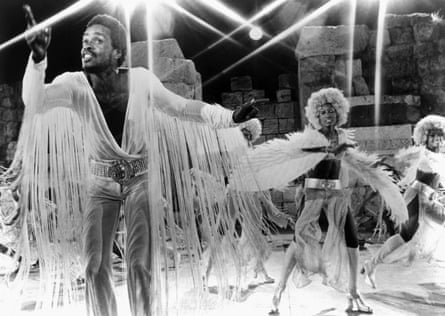
This year sees the 50th anniversary of the show’s opening night. To mark this, the original double album is being rereleased, with interviews, outtakes, photographs and a new book. Covid-permitting, the musical will go on tour, too. Rice is keen to get the original cast – those who are still alive, that is.
“It was ahead of its time,” he says. “I don’t think anybody had put a heavy rock band and an orchestra on Broadway at the same time.” It was originally written as a studio album and, controversially, Rice gave sympathetic voices to Judas Iscariot and King Herod. The record was even banned – briefly – by the BBC for being sacrilegious. “No one on the radio played it,” he recalls.
But it fared better in America, reaching No 1 in 1971, and a Broadway opening followed. “When we arrived in New York, we were treated like Led Zeppelin. It was amazing, it was weird.” He switches to his American accent again: “We’ve got 24 interviews coming up, guys. We’re gonna do a big presentation on Fifth Avenue. Then we’re gonna go to LA and Toronto and Chicago.”
Despite their huge success, Rice and Lloyd Webber split in the 80s. While the composer was determined to make more mainstream musicals, Rice was drawn to the unconventional. He worked with Abba’s Benny and Björn on Chess, a musical about the rivalry between two grandmasters, one American, one Russian. Later came a stint in Hollywood, working with Elton John and the composer Alan Menken, writing songs for the Disney films The Lion King and Aladdin.
Elton was a “refreshing change” because he insisted on the lyrics being written before the music. “Initially, I was daunted. I asked Elton if he had something – anything – I could use. But he said no, he wanted the words first. That’s just how Elton did things.” He pauses. “In the end, I think it helped me.”
Of all the many people he collaborated with, Rice has a soft spot for Freddie Mercury. They got together thanks to the original Evita, Elaine Paige, who had made an album of Queen covers. “Freddie loved it,” says Rice. “And through that I got to know him. And out of the blue, he invited me to write a couple of songs for his Barcelona album with Montserrat Caballé.”
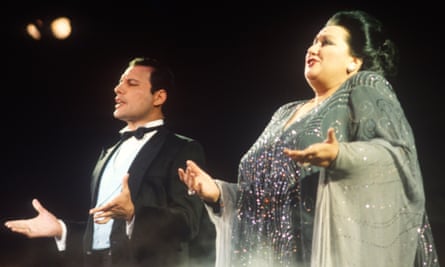
He got to see a different side to the flamboyant Queen frontman, who died in 1991. “I saw Freddie more often quiet than going berserk. He had a very calm speaking voice. He let it all out on stage. I think we might have done something in theatre together, or opera even, had Freddie lived. It was so tragic.”
Rice certainly has no shortage of memories and these days, perhaps because of Covid, he seems anxious to tie up loose ends. “Getting old is bit of a drag,” he says. In part, that’s why he’s been recording his thoughts in a weekly podcast, Get Onto My Cloud, an idea that came from a cricketer friend. It’s a sort of audio autobiography, he says, a way of setting the record straight on a few things. “I haven’t a clue if people are listening,” he says, “but I’m enjoying it.”
Is there anyone he would still like to work with? “There’s no one, really. I’ve written with some of the greatest. I’m quite happy with my lot.” But he does have one idea up his sleeve. Of his 145 unused songs, Rice thinks he could take the best 15 and turn them into a show. “I’ve got the score,” he says. “I just need a story.”
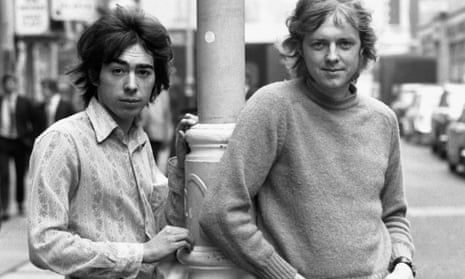
Comments (…)
Sign in or create your Guardian account to join the discussion